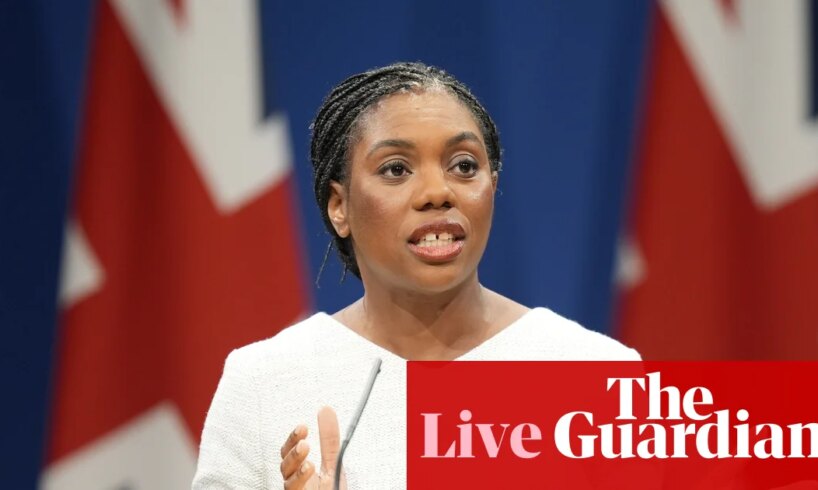
Tory stamp duty plan ‘to benefit the wealthiest the most’
Meanwhile, the Social Market Foundation (SMF) thinktank says that the Conservatives’ plans to abolish stamp duty “will benefit London and wealthiest homeowners the most”.
Theo Betram, director at the SMF, said:
Stamp duty is a brake on the housing market, stops people moving for work, prevents more downsizing. Scrapping it solves these issues, but the benefit will disproportionately go to homeowners and to those in the south east and London, who will gain the most.
The credibility test for the Conservatives is whether they can really make sustained savings of at least £12bn annually to fund the cut. Reforming council tax and introducing a property-based tax could make the stamp duty cut more credible, sustainable and fairer, helping those on lower incomes and around the country.
Together with the £5,000 rebate for first time buyers, this is a policy idea that will stimulate demand for homes but the supply side needs solving.
Share
Updated at 16.01 CEST
Key events
Show key events only
Please turn on JavaScript to use this feature
Closing summary
The Conservatives will scrap stamp duty on sales of primary residences if they win the next election, Kemi Badenoch has said, in a policy-heavy speech designed to improve her standing as Tory leader and her party’s economic credibility with voters. Badenoch told her party’s conference she would abolish the tax that new buyers in England and Northern Ireland have to pay on house purchases over £125,000, at an estimated cost of £9bn a year.
The Social Market Foundation (SMF) thinktank says that the Conservatives’ plans to abolish stamp duty “will benefit London and wealthiest homeowners the most”. Theo Betram, director at the SMF, said: “Stamp duty is a brake on the housing market, stops people moving for work, prevents more downsizing. Scrapping it solves these issues, but the benefit will disproportionately go to homeowners and to those in the south east and London, who will gain the most.”
Meanwhile, Kemi Badenoch unveiled a “golden rule” to reduce government borrowing through spending cuts as she sought to rebuild the Conservatives’ reputation for economic credibility. In a speech at the Tory party conference, she promised that at least half of all the money saved through spending cuts would be used to bring down the country’s deficit, with the remainder used for tax cuts and other measures aimed at economic growth.
Responding to Kemi Badenoch’s conference speech, TUC general-secretary Paul Nowak said the Tories are becoming “ever more irrelevant”. He said: “At a time when the country and working people are facing real challenges, the Tories have no answers. They haven’t learnt their lesson from the last election.”
Keir Starmer has criticised Robert Jenrick’s comments complaining about “not seeing another white face” in parts of Birmingham, saying the shadow justice secretary was “hard to take seriously”. The prime minister suggested Jenrick’s comments were part of a stealth Conservative leadership campaign and said he did not believe he painted a true picture of the area of Handsworth, which Jenrick had described as “as close as I’ve come to a slum in this country”.
Ministers are preparing to raise the amount the NHS pays pharmaceutical firms for medicines by up to 25% after weeks of intensive talks with the Donald Trump administration and drugmakers. The government has drawn up fresh proposals to end a standoff with the industry over drug pricing, including changing the cost-effectiveness thresholds under which new medications are assessed for use on the NHS, according to industry sources.
Keir Starmer will order the home secretary to look at further curbs on protests including potential powers to take action against specific inflammatory chants at pro-Palestinian protests. Speaking to reporters en route to Mumbai, the prime minister said Labour was looking at going even further than the measures announced by Shabana Mahmood, which would look at the “cumulative impact” of repeat protests in certain locations.
Legal experts have questioned the explanation given by the Crown Prosecution Service for its sudden decision to drop charges against two Britons accused of spying for China amid a political row over who was responsible. The expert lawyers expressed surprise that the CPS thought it needed further assurance from the government that China was an enemy insofar as it posed “a current threat to national security” before the trial of Christopher Cash and Christopher Berry could go ahead.
The prospect of a Reform government at Westminster makes the question of Scottish independence more essential than ever, first minister John Swinney said as he launched a new policy paper on the matter today. These independence papers, kicked off by his predecessor but one Nicola Sturgeon, have become a running sore amongst opposition MSPs. The timing of today’s launch was notable, ahead of the SNP’s annual party conference in Aberdeen, which begins this Saturday and includes a debate on independence strategy and what a majority win for the SNP at next May’s Holyrood election would mean.
Share
Abolishing stamp duty is “the single best reform any government could make to Britain’s tax system,” according to Institute of Economic Affairs (IEA).
The IEA’s executive director Tom Clougherty said:
Abolishing stamp duty is the single best reform any government could make to Britain’s tax system.
As things stand, this outdated and uneconomic levy is wreaking havoc on our already troubled housing market – by deterring sales and depressing house-building.
Indeed, research suggests that the wider social and economic harms are equivalent to three-quarters of the revenue raised – and that’s on top of the loss to the people actually paying the tax.
This means that stamp duty is many times more damaging, as a source of revenue, than broad-based taxes on income and consumption.
Any proposal to permanently cut or abolish it is therefore extremely welcome.
Share
Updated at 16.58 CEST
Responding to Kemi Badenoch’s conference speech, TUC general-secretary Paul Nowak said the Tories are becoming “ever more irrelevant”.
He said:
At a time when the country and working people are facing real challenges, the Tories have no answers. They haven’t learnt their lesson from the last election.
All they have to offer is more division, more austerity and more false promises. As the Conservatives drift to the extremes, they’re becoming ever more irrelevant.
Share
Tory stamp duty plan ‘to benefit the wealthiest the most’
Meanwhile, the Social Market Foundation (SMF) thinktank says that the Conservatives’ plans to abolish stamp duty “will benefit London and wealthiest homeowners the most”.
Theo Betram, director at the SMF, said:
Stamp duty is a brake on the housing market, stops people moving for work, prevents more downsizing. Scrapping it solves these issues, but the benefit will disproportionately go to homeowners and to those in the south east and London, who will gain the most.
The credibility test for the Conservatives is whether they can really make sustained savings of at least £12bn annually to fund the cut. Reforming council tax and introducing a property-based tax could make the stamp duty cut more credible, sustainable and fairer, helping those on lower incomes and around the country.
Together with the £5,000 rebate for first time buyers, this is a policy idea that will stimulate demand for homes but the supply side needs solving.
Share
Updated at 16.01 CEST
Kemi Badenoch’s understanding that the North Sea will play a critical role in the UK’s energy has been welcomed in a statement from the British Chamber of Commerce (BCC).
Tim Snowball, director of communications and public affairs at the BCC, said:
We welcome the Leader of the Opposition putting economic stability at the heart of her speech and acknowledging that businesses are key to driving growth.
Firms fully recognise apprenticeships as high-quality qualifications which help support important skills pipelines. While an extra funding pledge is welcome, it’s important the UK’s world-class university sector does not suffer as a result.
It was encouraging to hear Mrs Badenoch understand the critical role the North Sea will continue to play in our energy needs for some time to come. We’ve been clear, this must be supported by an end to the Energy Profits Levy.
Snowball did, however, warn against the Tory pledge to ditch the Climate Change Act. He added:
However, business will be alarmed over plans to scrap the Climate Change Act, which feel like a retrograde step for the long-term transition and the UK’s ability to attract investment.
As the Conservatives continue to develop policies, we look forward to engaging directly with the party to make sure the UK remains a competitive place to start, grow and invest in a business.
Share
Updated at 15.34 CEST
Libby Brooks
The prospect of a Reform government at Westminster makes the question of Scottish independence more essential than ever, first minister John Swinney said as he launched a new policy paper on the matter today.
These independence papers, kicked off by his predecessor but one Nicola Sturgeon, have become a running sore amongst opposition MSPs.
The timing of today’s launch was notable, ahead of the SNP’s annual party conference in Aberdeen, which begins this Saturday and includes a debate on independence strategy and what a majority win for the SNP at next May’s Holyrood election would mean.
While the SNP is topping the polls, there is still a significant gap between voters who support independence and those who say they will vote for the nationalists next May.
Today, Swinney said that the UK context made independence even more pressing:
Given the direction Westminster is intent on taking Scotland day by day, the need for people in Scotland to consider an alternative future is becoming more and more pressing.
The prospect of Nigel Farage becoming prime minister is a very real one, but even if Farage does not make it to No 10, he is driving the agenda at Westminster ever more to the right.
Share
NHS could pay 25% more for medicines under plan to end row with drugmakers and Trump
Julia Kollewe
Ministers are preparing to raise the amount the NHS pays pharmaceutical firms for medicines by up to 25% after weeks of intensive talks with the Donald Trump administration and drugmakers.
The government has drawn up fresh proposals to end a standoff with the industry over drug pricing, including changing the cost-effectiveness thresholds under which new medications are assessed for use on the NHS, according to industry sources.
The row has been cited as one of the reasons why big companies in the sector, including MSD (known as Merck in the US) and AstraZeneca, have cancelled or paused investments in the UK in recent weeks, while ramping up investments in the US.
The health department is in a standoff with the Treasury and No 10 on how to fund the deal, with Downing Street resisting pressure to commit new funds for medicines in next months’ budget.
The Liberal Democrats immediately attacked the move, first reported by Politico, asking how much it would cost and whether it would lead to cuts elsewhere in the NHS.
Share
Green leader Zack Polanski says Badenoch’s speech shows she’s ‘completely ignorant’ of state of public services
Andrew Sparrow
Zack Polanski, the Green party leader, says Kemi Badenoch’s speech showed she is “completely ignorant” of the state of public services. In a statement, he said:
Kemi, whilst struggling for any last semblance of relevance, feels like she’s talking in a completely different time and place. She was speaking to the room, not listening to the nation. While she got rounds of applause from men in suits sitting in front of her, she still sounds painfully out of touch with those dressed and ready to work for this country.
You can’t preach about a ‘strong economy’ while protecting the wealth of billionaires and underfunding the nurses, teachers and carers who keep this country going. When she says “work is the best way out of poverty”, she shows her ignorance of the millions of Brits who are earning poverty wages, not enough to live on, let alone thrive.
She has shown herself to be completely ignorant of the crumbling frontline services that millions rely on. It’s as if she hasn’t spoken to the millions of people who are working full-time but are unable to pay their bills.
The Conservatives would instead have you believe it’s the borders that are causing people to be unable to pay their bills. This is a lie. And the truth is simple. Our borders are being used as a distraction.
If the government taxed the super-rich and the extreme wealth properly, we could rebuild our NHS, invest in green jobs and give everyone the security they deserve.
That is all from me for today. Tom Ambrose is taking over now.
Share
Starmer says last Tory government’s stance on China was reason why spy trial collapsed
Jessica Elgot
Jessica Elgot is the Guardian’s deputy political editor.
Keir Starmer has again insisted the policy of the previous Tory government on China was the main factor in the collapse of a major Chinese espionage trial, despite criticism from the chief prosecutor that the Labour government would not give them enough evidence to prove China was a national security threat.
Speaking in Mumbai on a visit to a football ground, the prime minister said:
As you know, we were disappointed that the trial didn’t proceed, but the position is very clear that the trial would have had to take place on the basis of the situation as it was at the time under the previous Tory government.
So whatever their position was was the only position that could be presented at trial. So it wasn’t ,as it were, this government’s position. It was the Tory government before the position. Now that’s not a political to and fro, that’s a matter of law.
You have to prosecute people on the basis of the circumstances at the time of the alleged offence, and so all the focus needs to be on the policy of the Tory government in place then. That’s the only place that the evidence could be focused on.
Starmer, who has undertaken several business viss on Wednesday on the two-day trip to India, addressed more than 120 UK business leaders who have travelled with him. The PM visited a Bollywood studio to announce three new major Indian films will be made in UK studios in the coming years.
But several business chiefs on the trip have said that a key bar to further trade is restrictions on visas. Starmer denied that was the case. He said:
None of them have raised with me the question of visas. That wasn’t part of the FTA (free trade agreement).
What this is about is providing opportunities for them to take advantage of the FTA, and even before it’s fully enforced, the mood is very, very strong between India and the UK, and I’m really pleased. And they’re all bubbling with ideas. We’re doing deals. They’re doing deals every day.
Speaking at Cooperage Football Ground, near Mumbai’s Maidan Oval cricket ground, Starmer swerved whether he would raise Modi’s friendship with Vladimir Putin when the pair meet tomorrow.
Our defence of Ukraine is as solid as ever, and we’re a leading player in that. But I’m also really pleased the relationship with India is really strong, probably stronger now than it has been for some considerable time.
Keir Starmer with young people at a British Premier League football training facility in Mumbai, India, today. Photograph: WPA/Getty ImagesShare
Ed Davey invites one nation Tories to join Lib Dems
Ed Davey, the Lib Dem leader, has responded to Kemi Badenoch’s speech by releasing an “open letter” to one nation Conservatives inviting them to join his party. He says:
The Conservative party under Kemi Badenoch is becoming more extreme and out of touch, chasing Nigel Farage instead of focusing on the issues that really matter to people. Meanwhile, Reform UK is growing in strength – threatening the tolerant, decent values that hold our communities together.
I know many one nation Conservatives are deeply concerned about the lurch to the hard right in our country and under Kemi Badenoch’s leadership. Her plans to tear up the Climate Change Act and withdraw from the ECHR show she is abandoning traditional British values of tolerance, decency and the rule of law.
So my message to the millions of One Nation Conservatives who feel let down by their party and reject the divisive politics of Badenoch and Farage is to come and join us. Help us save our country and defend the values we all hold dear.
Share
The Labour party has issued this statement about Kemi Badenoch’s speech. It’s from Anna Turley, the Labour chair.
Kemi Badenoch is in complete denial. The public saw the Tories’ disastrous blueprint for Britain across their 14 years of failure in government – and the Conservatives still won’t apologise for the mess they left.
Labour has not commented directly on the stamp duty proposal.
Share
How Tories say they would cut spending by £46.9bn a year, with new commitments worth £21.1bn a year
The Conservatives have also released a scorecard summing up how much they would save from the spending cuts they are proposing, and where they would spend the money. They say they would save £46.9bn a year, and they would spend £21.1bn extra a year. They say the rest is available for deficit reduction – “in keeping with Kemi Badenoch’s golden rule for the public finances, that at least half of all savings will be spent on deficit reduction and the rest on tax cuts and other priorities”.
Scorecard for Tory proposals for spending cuts and spending commitments Photograph: CCHQShareKemi Badenoch giving her speech to the conference. Photograph: Ian Forsyth/Getty ImagesShare
How Badenoch’s proposed stamp duty cut would work
Here is an extract from the briefing the Conservative party has put out about their proposal to abolish stamp duty.
Under Kemi Badenoch’s leadership, we want to support the public in taking the first step to building a family, building wealth, and building communities that last, which is why stamp duty land tax (SDLT) – paid when you buy a residential property – will be abolished entirely on primary residences.
This policy will apply irrespective of purchase price for primary residences. It will not apply to additional properties, properties purchased by companies, or by non-UK residents. It will not apply to Scotland or Wales where separate taxation exists.
Under Labour, stamp duty has been increased this year, including for first-time buyers, as the higher thresholds introduced by the Conservatives were discontinued. Currently buyers have to pay stamp duty on properties worth more than £125,000, but the SDLT levels, and thresholds for the higher bands, were set in 2014, and will still be in place in 2030, despite years of inflation.
This stealth tax – fiscal drag – is sucking more and more people into paying the tax, and pushing more people into paying at the higher rates.
The Institute for Fiscal Studies has warned about the damaging impacts of stamp duty, saying that: “in a crowded field, SDLT has a claim to be the most economically damaging tax in the UK. It makes both housing and labour markets less efficient, acting as a drag on growth. It should be reduced or – even better – abolished, and certainly not increased”.
Share
Badenoch’s speech – snap verdict
Tories love a tax cut, and today Kemi Badenoch gave her audience exactly what they wanted. Stamp duty was always unpopular (not just with Conservatives – economists like the ones at the IFS think it’s a very bad tax too) and she announced that a Conservative government would abolish it. The Tories says abolishing stamp duty on primary residences would cost £4.5bn, but they say they are setting aside £9bn for this because they expect the revenue from stamp duty to go up before 2029-30.
This came at the end of a speech that was solid, clear, probably overly negative, but which at least set out a clear, and quite comprehensive account of what a Badenoch government might do.
The most obvious problem is that, at this stage of the electoral cycle, opposition policy pledges are largely fantasy, and tax promises are particularly implausible. Badenoch unveiled her announcement right at the end of her speech, like a chancellor delivering the budget, and elsewhere in her speech (for example, when she declared “I am reversing this” in relation to net zero policies), she sounded like a politcian with a deluded view of the power she actually has. Still, opposition parties have to communicate to the public what they stand for and policy announcements – even Potemkin ones – can perform this function. So it is not wholly ridiculous.
And it capped a speech that was a light on culture war grievance (Badenoch’s obsession, until quite recently) and largely focused on the economy. She is right to conclude that Labour is vulnerable on the economy. Only three years after Liz Truss, the Tories are actually ahead of Labour in polling in economic competence and this was a speech designed to build on that.
When she addressed the Tory conference last year, as a leadership contender, Badenoch said that what Britain needed was “the sort of project not attempted since the days of Keith Joseph in the 1970s, a comprehensive plan to reprogramme the British state, to reboot the British economy, a new blueprint for the great machine of our country”. One year on, this has not quite materialised. What she was announcing was certainly a departure from the past, but it was not the radicalism she was promising in 2024. Abolishing stamp duty has been on the Tory low tax wishlist for years. Leaving the ECHR is transformational, but in that Badenoch was only really catching up with what Robert Jenrick was proposing a year ago.
There was more evidence of the Jenrick leadership threat (see 9.19am) in the substance of the speech. Having told people a year ago that she did not want to rush into a programme for government, she has now produced more or less exactly that. It felt like a job protection mechanism as much as a manifesto.
Voters are paying zilch attention to the Tories at the moment, and it is quite possible that the stamp duty announcement – even with lift-off from the rightwing papers and GB News – will swiftly be forgotten. If it isn’t, though, there is another risk for Badenoch. The Tories are proposing to fund this with colossal cuts worth £47bn, including welfare cuts worth £23bn. No party has ever made welfare cuts on that scale popular and, while the media mostly ignored them when Mel Stride set them out on Monday (because no one in the media thinks the Tories will be in power after the election), now the Labour attack unit has an incentive to explain what impact they would have. Badenoch has given her a reason to do that.
Still, Badenoch has got through the week. She might not be engaging the electorate, but Conservative party members will be moderately heartened by her performance.
There was another line in her speech last year that has not stood the test of time. Talking about her father, she said: “He also taught me responsibility. He would say, 80% of what happens to you is down to you.” But, if Badenoch is floundering as an opposition leader, it is not 80% down to her. It is 80% because she inherited a party that governed badly for 14 years and is now heartily disliked. Her speech today was fine, in Tory terms, but it still quite likely that next year someone else will be on delivering it.
Share
Badenoch is now winding up. Here is the peroration.
I stand for a government that takes less of your money and doesn’t interfere in your life, where the state does less but does it better, where those who create wealth are welcomed with open arms, not driven from our shores, where reward matches effort, where Britain stands tall in the world.
I stand for an economy where profit is not a dirty word, where enterprise is supported not crushed.
I stand for a country where what you put in determines what you get out, where excellence is celebrated.
I stand for a country where actions have consequences, where we talk about responsibilities as well as rights, where crime is punished and justice is served, where the welfare of victims outweighs the welfare of criminals.
I stand for a society where free speech trumps hurt feelings, where everyone knows what a woman is, where people are judged by the content of their character, not the colour of their skin, whether vulnerable or supported, but where freeloaders are told where to get off.
Conference, I stand for stronger borders and a stronger economy so that the young can fulfil their potential, the old can live out their years in dignity, and everyone can achieve their dreams, to own a home, run a business, raise a family.
This is the Britain I stand for.
If it is the Britain you stand for, then stand with me, and let’s build it together.
Share
Badenoch says this move would “unlock a fairer and more aspirational society”.
People of all ages will benefit, she says.
And she says, every time people move, that generates other economic activity.
She says she can promise this while not breaking her golden rule.
According to this BBC explainer, the government raised £11.6bn from stamp duty in 2023-24.
Share
Badenoch says next Tory government will abolish stamp duty
Badenoch says, because of all the savings she has promised, she can afford one more announcement.
As the Conservative party, we know who our people are. They are people who work hard, they are the people who plauy hard, they are the people who understand the importance of putting down roots.
They are the people who make sacrifices today for a better life.
They are also people who want to own their own home, she says.
But there is a barrier – the tax you have to pay – stamp duty, she says.
Stamp duty is a bad tax, she says, an un-conservative tax.
We must free up our housing market, because a society where no one can afford to buy, or move is a society where social mobility is dead.
Badenoch says she looked at moving the thresholds. But decided against that.
Instead, the next Conservative government will abolish stamp duty, she says.
This gets a long round of applause.
Share
Badenoch is now running through a list of Conserative policies.
Kiran Stacey explained the key ones here.
Share
Source





